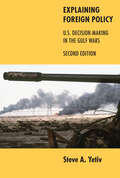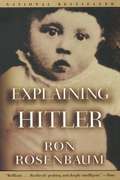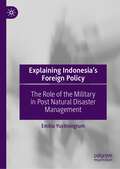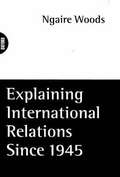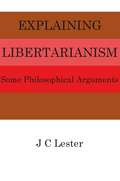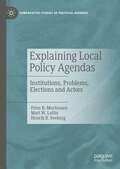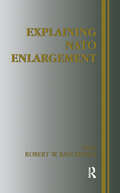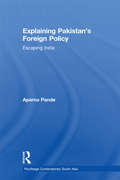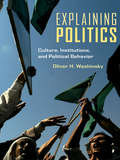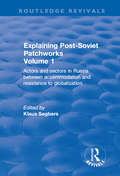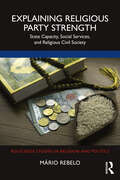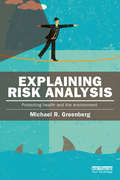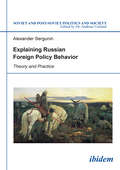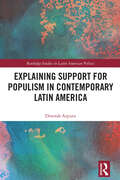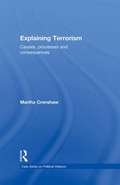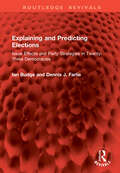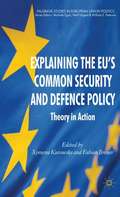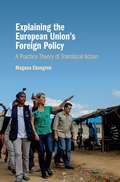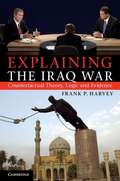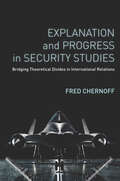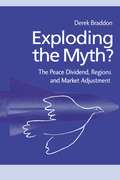- Table View
- List View
Explaining Foreign Policy: U.S. Decision-Making in the Gulf Wars
by Steve A. YetivSteve A. Yetiv has developed an interdisciplinary, integrated approach to studying foreign policy decisions, which he applies here to understand better how and why the United States went to war in the Persian Gulf in 1991 and 2003. Yetiv’s innovative method employs the rational actor, cognitive, domestic politics, groupthink, and bureaucratic politics models to explain the foreign policy behavior of governments. Drawing on the widest set of primary sources to date—including a trove of recently declassified documents—and on interviews with key actors, he applies these models to illuminate the decision-making process in the two Gulf Wars and to develop theoretical notions about foreign policy. What Yetiv discovers, in addition to empirical evidence about the Persian Gulf and Iraq wars, is that no one approach provides the best explanation, but when all five are used, a fuller and more complete understanding emerges.Thoroughly updated with a new preface and a chapter on the 2003 Iraq War, Explaining Foreign Policy, already widely used in courses, will continue to be of interest to students and scholars of foreign policy, international relations, and related fields.
Explaining Hitler: The Search for the Origins of His Evil
by Ron RosenbaumDocuments a variety of authors' takes on the reasons behinds Hitler's actions.
Explaining Hitler: The Search for the Origins of His Evil, updated edition
by Ron RosenbaumIn Explaining Hitler, Ron Rosenbaum investigates the meanings and motivations people have attached to Hitler and his crimes against humanity. What does Hitler tell us about the nature of evil? In often dramatic encounters, Rosenbaum confronts historians, scholars, filmmakers, and deniers as he skeptically analyzes the key strains of Hitler interpretation. A balanced and thoughtful overview of a subject both frightening and profound, this is an extraordinary quest, an expedition into the war zone of Hitler theories, "a provocative work of cultural history that is as compelling as it is thoughtful, as readable as it is smart” (New York Times). First published in 1998 to rave reviews, Explaining Hitler became a New York Times-bestseller. This new edition is an update of that classic and a critically important contribution to the study of the twentieth century’s darkest moment.
Explaining Indonesia’s Foreign Policy: The Role of the Military in Post Natural Disaster Management
by Emilia YustiningrumThis book examines Indonesia’s post-Aceh tsunami disaster management through the lens of a multifaceted foreign policy decision-making process involving a variety of bureaucratic actors. It argues that organizational structure and bargaining aspects are as important as power and interests in explaining foreign policy making in the Indonesian context. When the Aceh tsunami struck in late 2004, the use of foreign military assets in responding to natural disasters was not a common feature in Indonesian history—Jakarta remained reticent to engage foreign military enclaves within its own territories. This greatly affected Indonesia’s security cooperation with other countries, including Australia. Prior to the Aceh tsunami, natural disaster management was a domestic political issue. The unprecedented decision by the government of Susilo Bambang Yudhoyono to approve foreign military assistance for military operations other than war (MOOTW) in Aceh was a result of domestic and international factors. This book addresses timely yet fundamental questions about Indonesian foreign policy decision making that led to the involvement of foreign militaries in the country’s worst-ever natural disaster. As a former colony that prized the value of non-interference, the Indonesian government had to make a difficult decision about whether to accept offers of international assistance from countries including Australia. With this, the book explores why the Indonesian government decided to approve Australian humanitarian assistance following the 2004 Aceh tsunami, and how governmental agencies managed this assistance.
Explaining International Relations Since 1945
by Ngaire WoodsThe book is a collection of 16 articles on international relations by leading authors in the field. It discusses new theoretical concepts with numerous examples taken from world events. The effectiveness of the UN, NATO, SEATO, the EEC, etc. is discussed in detail.
Explaining Libertarianism: Some Philosophical Arguments
by J. C. LesterExplaining Libertarianism: four theses: 1. Interpersonal liberty requires an explicit, pre-propertarian, purely factual, theory. 2. Liberty is and need only be morally desirable in systematic practice, not in every logically possible case. In practice, there is no clash between the two main moral contenders: rights and consequences. 3. Nothing can ever justify, support or ground any theory of liberty or its applications because it is logically impossible to transcend assumptions. Theories can only be explained, criticised and defended within conjectural frameworks. 4. The state is inherently authoritarian and also negative-sum. It reduces welfare overall, with the losses compounding over time. Libertarian anarchic order is the positive-sum solution to illiberal political chaos. J C Lester is a philosopher of libertarianism. He has written widely on the subject in books, articles and dialogues. His solution to the crucial philosophical problem of interpersonal liberty provides an explicit theory of liberty and explains how its application entails self-ownership and external property, and relates to all other interpersonal matters.
Explaining Local Policy Agendas: Institutions, Problems, Elections and Actors (Comparative Studies of Political Agendas)
by Peter B. Mortensen Matt W. Loftis Henrik B. SeebergBuilding on hundreds of thousands of systematically collected and content-coded local policy agenda observations, this book examines – theoretically and empirically - the policy agenda effects of four central aspects of any political system: the institutions that structure politics; the problems confronting the political system; the occurrence of regular and free elections; and the actors navigating the political system. Developing an explanatory model based on these four factors not only improves our understanding of the determinants of the local policy agenda but also contributes to a further integration of local government research, policy agendas research, and the broader discipline of political science. The book may be of particular interest to scholars and students of comparative politics, agenda setting, public policy, and local government.
Explaining NATO Enlargement
by Robert W. RauchhausThis work evaluates the pros and cons of NATO enlargement. It explains why NATO offered membership to three of its Cold War adversaries and makes recommendations about which countries, if any, should be offered membership in the future.
Explaining Pakistan's Foreign Policy: Escaping India (Routledge Contemporary South Asia Series)
by Aparna PandePakistan has over the decades become a hotbed for the terrorist ideology often referred to as Jihadism. This book investigates the underlying principles of Pakistan’s foreign policy from 1947 until the present day, and explains the rise of Jihadism as an offshoot of Pakistan’s security concerns. The book goes on to discuss that from its inception as a separate state, Pakistan’s foreign policy focused on ‘seeking parity’ with India and ‘escaping’ from an Indian South Asian identity. The desire to achieve parity with its much larger neighbour led Pakistan to seek the assistance and support of allies. The author analyses the relationship Pakistan has with Afghanistan, United States, China and the Muslim world, and looks at how these relationships are based on the desire that military, economic and diplomatic aid from these countries would bolster Pakistan’s meagre resources in countering Indian economic and military strength. The book presents an interesting contribution to South Asian Studies, as well as studies on International Relations and Foreign Policy.
Explaining Politics: Culture, Institutions, and Political Behavior
by Oliver WoshinskyThis unique text offers a comprehensive overview of who participates in politics and why, how social and political institutions shape that involvement, and, ultimately, what form citizen political participation takes. Drawing on a multitude of factors to explain politics and political behaviour, Woshinsky shows that political outcomes depend on a complex interplay between individuals and their environment. Psychology, personality, and ideology, together with culture, institutions, and social context shape political behaviour. Explaining Politics offers a wealth of comparative examples and practical applications through a lively and engaging narrative.
Explaining Post-Soviet Patchworks: Volume 1: Actors and Sectors in Russia Between Accommodation and Resistance to Globalization (Routledge Revivals)
by Klaus SegbersThis title was first published in 2001: Based on extensive research, this trilogy provides new insights into Post-Soviet transformations without taking refuge in the traditional assumption that Russia is unique. Using powerful analytical tools, this trilogy marks the re-integration of the Former Soviet Union (FSU) into the main current of political science. An invaluable resource for all those interested in Russia and the Post-Soviet states. This first volume focuses on state, sectoral, and transnational actors from a predominantly rational choice perspective. The book includes an extensive introduction by the editor which uses additional material gathered by the project team on two polls, 1999 and 2000, which, in addition to the individual studies, provide sufficient data to obtain unprecedented insights into the basic preferences and the logic of action of the main players in Russia. The outcomes of this research will be particularly relevant for students, researchers, journalists and decision-makers interested in Russia and the Post-Soviet states’ politics, international relations, economics, social policy and sociology.
Explaining Religious Party Strength: State Capacity, Social Services, and Religious Civil Society (Routledge Studies in Religion and Politics)
by Mário RebeloExplaining Religious Party Strength explores why religious political parties are electorally successful in some countries but not in others. Drawing on insights from political science and sociology, this book argues that religious parties are typically formed for defensive reasons, reacting against state-builders’ attempts to secularize public services such as education, welfare, and healthcare. Building on these findings, the author argues that the strength of religious parties is determined by the infrastructural power of the state. Weak states that fail to provide adequate public services open up space for religious communities to build a dense network of private schools, hospitals, and charities, which translates into votes for religious political parties. By contrast, strong states that provide efficient public services squeeze out private welfare providers, undermining the electoral strength of religious political parties. The author tests this theory through statistical analysis, using a new dataset on all religious parties which have participated in national parliamentary elections between 1800 and 2015. He includes comparative historical analyses of Roman Catholic political parties in France and Italy and Sunni Islamic political parties in Egypt, Turkey, and Albania. This book will interest students and scholars of religion and politics, specifically those interested in party formation, voting, and political activism, as well as policymakers.
Explaining Risk Analysis: Protecting health and the environment (Earthscan Risk in Society)
by Michael R GreenbergRisk analysis is not a narrowly defined set of applications. Rather, it is widely used to assess and manage a plethora of hazards that threaten dire implications. However, too few people actually understand what risk analysis can help us accomplish and, even among experts, knowledge is often limited to one or two applications. Explaining Risk Analysis frames risk analysis as a holistic planning process aimed at making better risk-informed decisions and emphasizing the connections between the parts. This framework requires an understanding of basic terms, including explanations of why there is no universal agreement about what risk means, much less risk assessment, risk management and risk analysis. Drawing on a wide range of case studies, the book illustrates the ways in which risk analysis can help lead to better decisions in a variety of scenarios, including the destruction of chemical weapons, management of nuclear waste and the response to passenger rail threats. The book demonstrates how the risk analysis process and the data, models and processes used in risk analysis will clarify, rather than obfuscate, decision-makers’ options. This book will be of great interest to students and scholars of risk assessment, risk management, public health, environmental science, environmental economics and environmental psychology.
Explaining Russian Foreign Policy Behavior: Theory and Practice
by Alexander SerguninThis book aims to explain the reasons behind Russia's international conduct in the post-Soviet era, examining Russian foreign policy discourse with a particular focus on the major foreign policy schools of Atlanticism, Eurasianism, derzhavniki, realpolitik, geopolitics, neo-Marxism, radical nationalism, and post-positivism. The Russian post-Soviet threat perceptions and national security doctrines are studied. The author critically assesses the evolution of Russian foreign policy decision-making over the last 25 years and analyzes the roles of various governmental agencies, interest groups and subnational actors. Concluding that a foreign policy consensus is gradually emerging in contemporary Russia, Sergunin argues that the Russian foreign policy discourse aims not only at the formulation of an international strategy but also at the search for a new national identity.Alexander Sergunin argues that Russia's current domestic situation, defined by numerous socio-economic, inter-ethnic, demographic, environmental, and other problems, dictates the need to abandon superpower ambitions and to rather set modest foreign policy goals.
Explaining Russian Foreign Policy Behavior: Theory and Practice (Soviet and Post-Soviet Politics and Society #147)
by Alexander SerguninThis book aims to explain the reasons behind Russia's international conduct in the post-Soviet era, examining threat perceptions and national security doctrines. Serguning analyzes Russian foreign policy discourse with a particular focus on the major foreign policy schools of Atlanticism, Eurasianism, derzhavniki, realpolitik, geopolitics, neo-Marxism, radical nationalism, and post-positivism. The author critically assesses the evolution of Russian foreign policy decision-making over the last 25 years and analyzes the roles of various governmental agencies, interest groups and subnational actors. Concluding that a foreign policy consensus is gradually emerging in contemporary Russia, Sergunin demonstrates that Russian foreign policy discourse aims not only at the formulation of an international strategy but also the search for a new national identity. Sergunin argues that Russia's current domestic situation, defined by numerous socio-economic, inter-ethnic, demographic, environmental, and other problems, dictates the need to abandon superpower ambitions and to set modest foreign policy goals.
Explaining Support for Populism in Contemporary Latin America (Routledge Studies in Latin American Politics)
by Dinorah AzpuruExplaining Support for Populism in Contemporary Latin America investigates the stronghold that populism exerts on citizens in the developing world. More specifically, relying on regional surveys, this book explores why many citizens consistently supported eight populist presidents who were elected in contemporary Latin America. It examines the determinants of support for the populist presidents who governed Venezuela, Ecuador, Bolivia and Nicaragua between 1999 and 2019, and the variables that explain support for the most recent populist presidents in Mexico, Brazil and El Salvador between 2018 and 2023. Unique to this approach is a strong emphasis on the demand-side of populism and the use of country-specific survey data across the years. This book explores the determinants of support for populist presidents in four dimensions: demographic variables, ideological and policy-preference variables, performance variables, and variables related to representative democracy. Understanding what drives people to support populist leaders is critical for revitalizing representative democracy in Latin America. Furthermore, insights about the factors that lead citizens to support populism in Latin America can also inform the analysis of support for populism in other parts of the world.
Explaining Terrorism: Causes, Processes and Consequences (Political Violence Ser.)
by Martha CrenshawThis volume comprises some of the key essays by Professor Crenshaw, from 1972 to the present-day, on the causes, processes and consequences of terrorism. <P><P> Since the early 1970s, scholars and practitioners have tried to explain terrorism and to assess the effectiveness of government responses to the threat. From its beginnings in a small handful of analytical studies, the research field has expanded to thousands of entries, with an enormous spike following the 9/11 attacks. The field of terrorism studies is now impressive in terms of quantity, scope, and variety. Professor Crenshaw had studied terrorism since the late 1960s, well before it was topical, and this selection of her work represents the development of her thought over time in four areas: <P><P> defining terrorism and identifying its causes the different methods used to explain terrorism, including strategic, organisational and psychological approaches how campaigns of terrorism end how governments can effectively contribute to the ending of terrorism. <P><P> This collection of essays by one of the pioneering thinkers in the field of terrorism studies will be essential reading for all students of political violence and terrorism, security studies and IR/politics in general.
Explaining and Predicting Elections: Issue Effects and Party Strategies in Twenty-Three Democracies (Routledge Revivals)
by Ian Budge Dennis J. FarlieFirst published in 1983, Explaining and Predicting Elections is the first cross-national and comprehensive explanation of election results. It considers why one election differs from another and attempts to account for party gains and losses in the elections which have taken place in twenty-three democracies in the post-war period. Budge and Farlie base their study on a radically new view of party behaviour—Parties not arguing or debating over the same issues but ‘talking past each other’. Their book shows why it is in the parties’ interest to do this, how parties might improve their appeal, and how electors react in a broadly ‘rational’ manner by supporting one party alternative rather than another. The discussion also considers important topics—for example whether electors are abandoning old partisan loyalties and becoming more volatile.The usefulness of these ideas is measured and checked against new evidence from twenty-three countries. These ideas are then used to produce advance predictions of ten elections in different countries which are then checked against actual results. The reader can use the methods to make his own predictions for elections which interest him. In many ways this makes Explaining and Predicting Elections the most comprehensive and useful investigation of the election process yet produced. It will interest the general reader, political practitioner, historians, and election and area specialists.
Explaining the EU's Common Security and Defence Policy
by Xymena Kurowska Fabian BreuerAn engaging assessment of the theoretical debates on the EU's Common Security and Defence Policy (CSDP). The contributions to this volume bring together sophisticated theoretical frameworks and extensive empirical research. Pluralistic in its approach, the volume emphasizes the role of conceptual diversity for better explaining the EU's CSDP.
Explaining the European Union's Foreign Policy: A Practice Theory of Translocal Action
by Magnus EkengrenThe European Union was created for the purpose of encouraging peace on the continent, but today is increasingly active globally in areas such as diplomacy, development, humanitarian and consular aid, and civilian and military crisis management. Yet we know little about the forces that drive the Union to interact, influence and intervene outside its borders. This book offers a new theoretical perspective that explains how EU collective action is driven by practice, such as diplomatic routines and crisis management procedures. Using global case studies, Ekengren shows how the EU's representatives perform these routines, or transnational practices, across particular 'locales' around the globe, from Kosovo to Haiti. By connecting transnational and local forces in the explanation of EU foreign policy action, he presents an outline of a practice theory of translocal action. Scholars, policymakers and journalists will find this theoretically ground breaking book essential in understanding the European Union's foreign policy.
Explaining the History of American Foreign Relations
by Michael J. Frank Costigliola HoganOriginally published in 1991, Explaining the History of American Foreign Relations has become an indispensable volume not only for teachers and students in international history and political science, but also for general readers seeking an introduction to American diplomatic history. This collection of essays highlights a variety of newer, innovative, and stimulating conceptual approaches and analytical methods used to study the history of American foreign relations, including bureaucratic, dependency, and world systems theories, corporatist and national security models, psychology, culture, and ideology. Along with substantially revised essays from the first edition, this volume presents entirely new material on postcolonial theory, borderlands history, modernization theory, gender, race, memory, cultural transfer, and critical theory. The book seeks to define the study of American international history, stimulate research in fresh directions, and encourage cross-disciplinary thinking, especially between diplomatic history and other fields of American history, in an increasingly transnational, globalizing world.
Explaining the Iraq War: Counterfactual Theory, Logic and Evidence
by Frank P. HarveyThe almost universally accepted explanation for the Iraq War is very clear and consistent - the US decision to attack Saddam Hussein's regime on March 19, 2003 was a product of the ideological agenda, misguided priorities, intentional deceptions and grand strategies of President George W. Bush and prominent 'neoconservatives' and 'unilateralists' on his national security team. Despite the widespread appeal of this version of history, Frank P. Harvey argues that it remains an unsubstantiated assertion and an underdeveloped argument without a logical foundation. His book aims to provide a historically grounded account of the events and strategies which pushed the US-UK coalition towards war. The analysis is based on both factual and counterfactual evidence, combines causal mechanisms derived from multiple levels of analysis and ultimately confirms the role of path dependence and momentum as a much stronger explanation for the sequence of decisions that led to war.
Explanation and Progress in Security Studies: Bridging Theoretical Divides in International Relations
by Fred ChernoffExplanation and Progress in Security Studies asks why Security Studies, as a central area of International Relations, has not experienced scientific progress in the way natural sciences have#151;and answers by arguing that the underlying reason is that scholars in Security Studies have advanced a range of different notions of "explanation" or different criteria of "explanatory superiority" to show that their positions are better than rival positions. To demonstrate this, the author engages in in-depth content analysis of the generally recognized exemplars of explanation and explanatory superiority in three of the core debates in the disciplines: Why do states pursue policies of nuclear proliferation? Why do states choose to form the alliances they do? And why do liberal democratic states behave the way they do toward other liberal democracies? The book reveals that authors in the debates that have shown the most progress use similar criteria in arguing for and against the key explanations. In the nuclear proliferation debate, there is wide divergence in the criteria the most visible authors use, and there is wide divergence in the explanations offered. In the alliance formation/balance-of-power debate, there is some overlap of criteria the most important authors use, and there has been some limited movement toward consensus. In the democratic peace debate there has been much more overlap of criteria the most prominent authors use, and there is agreement on both some positive and negative conclusions.
Exploding Data: Reclaiming Our Cyber Security in the Digital Age
by Michael ChertoffA former Secretary of Homeland Security examines our outdated laws regarding the protection of personal information, and the pressing need for change. Nothing undermines our freedom more than losing control of information about ourselves. And yet, as daily events underscore, we are ever more vulnerable to cyber-attack. In this bracing book, Michael Chertoff makes clear that our laws and policies surrounding the protection of personal information, written for an earlier time, are long overdue for a complete overhaul. On the one hand, the collection of data—more widespread by business than by government, and impossible to stop—should be facilitated as an ultimate protection for society. On the other, standards under which information can be inspected, analyzed, or used must be significantly tightened. In offering his compelling call for action, Chertoff argues that what is at stake is not so much the simple loss of privacy, which is almost impossible to protect, but of individual autonomy—the ability to make personal choices free of manipulation or coercion. Offering vivid stories over many decades that illuminate the three periods of data gathering we have experienced, Chertoff explains the complex legalities surrounding issues of data collection and dissemination today, and charts a path that balances the needs of government, business, and individuals alike. &“Surveys the brave new world of data collection and analysis…The world of data as illuminated here would have scared George Orwell.&”―Kirkus Reviews &“Chertoff has a unique perspective on data security and its implications for citizen rights as he looks at the history of and changes in privacy laws since the founding of the U.S.&”—Booklist
Exploding the Myth?: The Peace Dividend, Regions and Market Adjustment (Routledge Studies in Defence and Peace Economics)
by Derek BraddonFrom a cold war peak of some $1000 billion per annum, world military expenditure has declined by about 40% since 1990, reaching its lowest level for thirty years. With such significant decline in global public expenditure committments to the defence sector, a substantial and lasting peace dividend was anticipated. Most governments believed that market forces, left more or less to their own devices, would deal effectively with this major exogenous shock and generate sufficient new economic activity to allow increased public expenditure on health, education and welfare. The approach of this book is to challenge the fundamental but flawed belief that a substantial and lasting peace dividend could be secured through market solution alone. The principal assertion is that market adjustment by itself cannot deliver such a dividend.The book focuses on the major aspects of the economic, business and security consequences of post Cold War defence expenditure reduction. Key problems obstructing optimal market response are identified and possible remedial action by government and others is considered.
